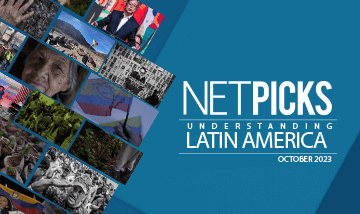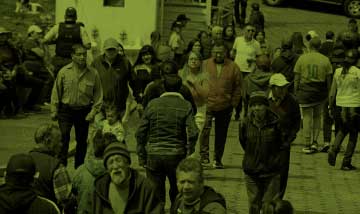Understanding Latin America
Dear readers and colleagues, this month we bring you seven recommendations that reflect the reality of Latin America: two from Chile, on the Constitutional Convention, and from Peru on the recent election of Pedro Castillo. And three additional articles one each from Cuba, Brasil and Honduras.
-
- The Constitutional process in Chile
- Pedro Castillo makes unity plea after finally being named Peru’s next president
- Peru and the Left’s Possibilities
- Cuba: Searching for nuance in a time of crisis
- Brazil’s vaccine underworld
- Land defenders: will the Cáceres verdict break the ‘cycle of violence’ in Honduras?
.
THE CONSTITUTIONAL PROCESS IN CHILE
In the two articles presented below, we offer some insights into how the process of writing a new Chilean Constitution may play out. The country’s Constitutional Convention was installed on July 4th, and with 45% female representatives, 17 seats for indigenous peoples, a female Mapuche President and large number of progressive representatives, there are hopes that the country will be able to shake of its neoliberal past and move towards a more socially conscious and environmentally sustainable model. On the other hand, as Maristella Svampa points out, a factor to be taken into account is the apparent gap between the ‘new social and political reference points’ and the candidates for this November’s Presidential elections.
“IT IS POSSIBLE TO REFOUND CHILE” Pierina Ferretti. July 07th, 2021
https://rosalux.org.ec/en/it-is-possible-to-refound-chile/
CHILE, THE MIRACLE OF REINVENTION Maristella Svampa. July 8th, 2021
https://rosalux.org.ec/en/chile-the-miracle-of-reinvention/.
PEDRO CASTILLO MAKES UNITY PLEA AFTER FINALLY BEING NAMED PERU’S NEXT PRESIDENT
On July nineteenth, one month after the elections were held, former rural schoolteacher Pedro Castillo was finally named President of Peru. His opponent in the second round, Keiko Fujimori, daughter of presently incarcerated former President Alberto Fujimori, reluctantly admitted defeat after her challenges to the legitimacy of the vote were rejected. However, Keiko has stated that “We have the right to mobilize … but in a peaceful manner and within the framework of the law.” Left winger Castillo has promised to redraft the constitution and increase taxes on mining companies, and to use those revenues to improve public services, including education and health, whose inadequacies were highlighted by the pandemic. The importance of his victory cannot be underestimated; according to Peruvian historian and Professor Cecilia Méndez, “There are no cases of a person unrelated to the professional, military or economic elites reaching the presidency.” But apart from Fujimori and the Peruvian right, the former teacher faces other major challenges, given that the poverty rate in Peru has risen to more than 30%, and the country is one of the world’s worst hit by Covid-19.
.Guardian Staff and Agencies. July 20th, 2021.
https://www.theguardian.com/world/2021/jul/20/castillo-set-to-become-peru-president-as-rival-fujimori-says-she-will-recognise-result.
PERU AND THE LEFT’S POSSIBILITIES
In the nineteen eighties Peru was a country with a strong left wing presence, the ‘United Left’ being the second-most-powerful national political force in the 1985 elections. The arrival on the scene of the Sendero Luminoso (The Shining Path) changed that, and the left subsequently became synonymous with terrorism and communism, even after Sendero’s defeat at the hands of President Alberto Fujimori. The left appeared to have overcome the obstacle when Ollanta Humala was elected in 2011 on a platform of change, but the celebration was short lived; Humala changed, but little else did. The success of Pedro Castillo, unionist and former school rural school teacher consequently brings with it renewed hopes despite the extremely tight nature of the victory over Keiko Fujimori: 50.125%, to Fujimori’s 49.875%. A representative of the Maoist, Mareategui influenced party, Free Peru, which has a traditional anti-neoliberal platform, Castillo was supported by large demonstrations organized by collectives, civil society associations, and human rights defenders, as well as by leftist political parties. However, says the author, “it is difficult to forecast exactly what Castillo’s administration will end up being, in a country that is so politically unstable, with high levels of inequality and turbulence, racism, and narrow-mindedness among its elites, added to an institutional left with a short-term, fragmented vision.” The hope is that despite the obstacles of an entrenched right wing Castillo and his allies will be able to move towards a different, more democratic and egalitarian Peru.
. Maristella Svampa. June 23rd, 2021.
https://rosalux.org.ec/en/peru-and-the-lefts-possibilities/
CUBA: SEARCHING FOR NUANCE IN A TIME OF CRISIS
The reasons for the outbreak of protest in Cuba are not hard to find, and are not new: Covid-19, food shortages, economic free fall, attempts at currency regulation and disputes over censorship. But as the authors say, what is new is a level of confrontation in which police attacked and detained many of the protestors and in turn were called ‘asesinos’ (murders); there are other notable differences: compared to the major protest of 1994, the ‘Maleconazo’, these protests are also more regional and black centered. Times have clearly changed, and one of the most disturbing aspects of the new scenario has been the authoritarian ‘war horn’ response of the national government and the characterization of protestors as ‘gusanos’ (worms), or the enemy. Resisting US intervention, claiming independence and supporting other nations in their own claims, making a place of safety for those fleeing violence, and bringing a people to dignity, literacy and health is what has made Cuba inspirational for so long, but, say the authors, in their contact with Cubans in the exterior the prevailing emotion is now one of sadness. What comes next is an unknown, and according to Cuban academic Julio César Guanche: “We know that there are certainties and duties of the ‘Revolution’s defense’: the population is a plural construct and is never the enemy, and the promise made in 1959 was ‘Freedom with bread, and bread without terror’.”
.Karen Dubinsky, Susan Lord. July 19th, 2021.
https://www.stabroeknews.com/2021/07/19/features/in-the-diaspora/cuba-searching-for-nuance-in-a-time-of-crisis/
BRAZIL’S VACCINE UNDERWORLD
A recent Senate investigation into a parallel system for the importation of vaccines has implicated allies of President Bolsonaro, even pointing the finger at the President himself. The Ministry of Health has been turned into a chaotic battlefield, says the author, and witnesses, including Bolsonaro supporters and allies, have painted a grim picture of businessmen, politicians, evangelical preachers, and army colonels profiting from vaccine trading, and of two rival groups, struggling for control. Bolsonaro allies even presented evidence to the President himself, but no action was taken. With Presidential elections coming up in 2022, Bolsonaro is already trailing former president Lula da Silva in all polls, and the scandal may prove to be the straw that breaks the camel’s back. In the meantime, Bolsonaro is campaigning against the country’s admired electronic voting system, while promoting the reintroduce of the ballot paper system which, says the author, was ‘frequently liable to fraud’.
. Jan Rocha. July 9th, 2021.
https://lab.org.uk/brazils-vaccine-underground/
LAND DEFENDERS: WILL THE CÁCERES VERDICT BREAK THE ‘CYCLE OF VIOLENCE’ IN HONDURAS?
Since the 2009 coup in which leftwing president Manuel Zelaya was deposed, the Honduran state has been working with large industrial companies in promoting major infrastructure projects. These have often been carried out with little regard for indigenous people or their rights, and in many cases accompanied by violence. In Honduras, the level of violence against people defending their land is extremely high, with the murder of Bertha Cáceres, in 2016, for protesting a dam development, drawing criticism around the world. According to the rights organization IM-Defensoras, seven other women have been killed in the country in similar circumstances, while 34 attempted murders were registered between 2016 and 2019. The conviction of the former head of the hydroelectric company, Robert David Castillo, for complicity in the murder of Cáceres is consequently historic. The conviction is being appealed, but Cáceres daughter, Berth Zuñiga, hopes the trial will send a message of no more impunity for violence against those fighting to protect traditional lands. In order to break the pattern of violence, says Zuñiga: “We need to stop the flow of financing, the flow of resources and international support to corporate actors that are supporting these kinds of criminal behaviors and violations.”
Lizy Davies. July 15th, 2021.
https://www.theguardian.com/global-development/2021/jul/15/will-caceres-verdict-help-end-honduras-cycle-of-violence





